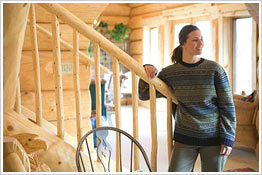What's in Your House?
We all have ideas/attributes/possessions that are hidden away in our "house." And these hidden assets are vital to ourselves -- to our well-being -- and to that of our family.
By Caryl W. Krueger
Categories: Elijah and Elisha, Family That question comes across quite dramatically when Elisha asks it in the Bible story found in II Kings, chapter 4. A woman has told him that her husband has died, her sons are about to be taken as slaves, and she has no resources left. Even so, Elisha asks "....what hast thou in the house?"
 We sometimes echo her discouragement when we feel our time is totally taken up with work and family, and our children are scrambling to keep up with school, sports, and extra-curricular activities. How can we have anything left in our "house" (our home, our busy day, our storehouse of ideas) - anything left to use or even share? We sometimes echo her discouragement when we feel our time is totally taken up with work and family, and our children are scrambling to keep up with school, sports, and extra-curricular activities. How can we have anything left in our "house" (our home, our busy day, our storehouse of ideas) - anything left to use or even share?
But Elisha proved that we all have ideas/attributes/possessions that are hidden away in our "house." We are not inferior or deprived - we have dominion, as it says in the first chapter of Genesis. And these hidden assets are vital to ourselves -- to our well-being -- and to that of our family.
To understand the answer to this essential question, you and your family could begin by reading the Elisha story and then asking a few questions: Was the woman willing to follow Elisha's suggestion? Did she argue that she didn't have the time or talent? Did she suggest that Elisha do the work for her? Did her sons get involved? Were her sons helpful? Did the story have a happy ending?
By this time, you will have made the point that we all have capabilities that we aren't using. We say we are the children of God, but we may be thinking we are limited by talent or time - or not even interested in sharing our talents. Again ask, "What's in your house?" What do each of us have that we can utilize for better family living and also for reaching out to others?
Here are some ideas to get a family discussion going - and your family will come up with more. However, the ideas aren't particularly helpful until they're put into practice.
Let's start with what youngsters have in their "house" that can be shared.
- Chores. Do something without being asked. Trade with a sibling. Do someone's work without taking or asking for credit. Make a home improvement no one thought of.
- Friends. Invite a new student from school to join in an activity. Offer to mentor a younger child who needs some help.
- Sports. Exercise a skill you didn't know you have. Try a totally new sport. Show younger kids easy-to-learn skills that you know.
- Toys and games. Get together with neighborhood pals and trade toys. Have a toy sale, saving money for new games or gifts to others or to purchase toys for children who don't have all that you have.
- Clothes. As winter comes, check to see if you have unused jackets or boots that could be donated to an organization outfitting less-affluent kids.
- The economy. Recycle. Turn off unused lights. Ride your bike instead of asking to be driven everywhere.
- Attitude. Express joy in all that you do. Show appreciation.
- Neighbors. Offer to shovel a sidewalk, bake cookies, lift, carry or move something.
- Reading. Without being reminded, read for 30 minutes a day and share what you learned with the family.
- Church. Surprise your Sunday School teacher by doing your assignment or sharing a good experience.
- Prayer. Talk to God daily as He is a fountain of good for every moment of your day.
Parents also have things in the "house" that can be uncovered and shared.
- Family. Each day, find something good achieved by each family member - and tell the individual about it.
- Friends. Enlarge your circle. At a sports event, sit next to a parent you don't know and start a conversation.
- Work. Let out-of-the-box thinking bring freshness to your job and greater usefulness to your employer. Take time to help others feel successful.
- Community. An hour a week or four hours a month is a great investment in your town. Find something you enjoy doing: serving at a soup kitchen, filing books at the library, coaching a team, folding letters for a mailing, writing a letter of thanks to a community official you don't already know.
- Attitude. Be a "can-do" parent guided by both principles and love.
- Read. Do it sitting in the car or waiting at an appointment. Snatch moments to read good books, including the Bible.
- Church. Sleep, sports, and TV are not as refreshing as an inspiring church service. Speak to strangers. Volunteer to usher. Give thanks for the sermon.
- Prayer. Take time each night to mentally tuck in those you love by enfolding them in your conviction of God's care of them.
What hast thou in the house? Far more than you can imagine--good things and good ideas to bless your family and your community. |